The event “One Integrated Marine Debris Observing System (IMDOS) for a Clean Ocean” took place from 17 to 19 November 2021. Attended by 197 participants from 46 countries, the event consisted of a series of three live online sessions in English and French. 26 excellent speakers and panellists from 18 different countries world-wide came together to share their knowledge and discuss the growing threat and multidimensional problem of marine debris to marine ecosystems, ocean and coastal users. The event also included a virtual poster hall featuring 50 posters, including seven video presentations on transdisciplinary approaches, monitoring technologies and modelling, networks and digital ecosystem contributing to global marine debris observation (click here). The poster hall will stay open until Nov 30th.
Intrinsically aligned with the UN Decade of Ocean Science for Sustainable Development and UN Sustainable Development Goal 14 “Life below water”, this event was organised as an official satellite activity to the Ocean Decade’s 3rd Laboratory: A Clean Ocean.
This event was organised by a consortium of 14 international ocean experts and hosted by GEO Blue Planet EU coordination office and Mercator Ocean International, as part of EU4OceanObs. This action is in line with GEO Blue Planet‘s mission to promote the development and use of earth observations for the benefit of society.
Strengthening scientific knowledge to monitor and reduce marine pollution
Prof. Nikolai Maximenko from the University of Hawaii opened the event with an introduction to the IMDOS concept, which was first presented at the OceanObs’19 conference.
Support of research, innovative solutions and mitigating actions requires an efficient observing system, including in situ measurements, sampling, remote sensing, and modelling. The concept of IMDOS harmonises these observational tools, approaches, and products to optimise efforts unravelling potential long-lasting effects on the planet.
The first session focused on giving a general introduction to marine debris and its impacts on the marine and coastal ecosystems by Maria Tsakona (GRID Arendal), Thomas Maes (GRID Arendal) and Amy Lusher (Norwegian Institute for Water Research). It also included a higher-level focus, on the importance of monitoring and assessment of marine debris for global policy by Heidi Savelli-Soderberg from UNEP, and a presentation on coastline litter monitoring and European legislative actions by Luis Ruiz from the European Commission’s Joint research Centre.
“More than an integrated system to assimilate and share information related to marine debris, the concept of IMDOS should incorporate strategies to expand the capacity of UNEP, Global Partnership on Marine Litter (GPML) and the Digital Platform to dialogue, train and feed the processes behind data acquisition as well as data governance arrangements in national and sub-national scales.” Alexander Turra (University of São Paulo), moderator of session 1.
Fostering new monitoring capacities
The second session explored new and existing technologies and modelling capabilities in tracking, monitoring marine debris, critical for supporting strategies and policies to reduce marine pollution and consequently, restore ocean health.
During the first part, speakers presented the monitoring capacities of marine debris sources (the industry or from atmospheric and rivers origin) and associated challenges. Speakers focused in the second half of the session on monitoring marine debris at sea using novel technologies (tracking devices, digital twin modelling and light-weight optical sensors) as well as involving local communities (fishermen and citizen scientists). The session was concluded by Francois Galgani (Ifremer) highlighting the importance of monitoring marine debris inputs from extreme events:
“Marine litter may be the consequence of natural events (i.e. hurricanes, tsunamis, large floods, cascading to the seabed), or accidents (i.e. containers losses, inputs from coastal discharges). With millions of tonnes of inputs possibly caused by single events (i.e. tsunamis), massive inputs from extreme events should be more closely considered in marine litter assessments.”
This session included 11 short presentations providing input from various stakeholders, from private companies and research institutions to NGOs, and citizen scientists.
Addressing marine debris pollution is only possible with the broad involvement of all stakeholders including the industry and the civil society.
Defining the future of IMDOS
The final session looked at the gaps in marine debris observations, highlighting the need to integrate and capitalise on the wide variety of observations from remote sensing to in situ, with powerful models and information from citizen scientists. The second part of the session discussed possible links between IMDOS and existing international programmes, networks and initiatives such as the monitoring harmonization and data sharing action taken by Japan (presented by Atsuhiko Isobe, Kyushu University) but also the Global Partnership on Marine Litter (GPML) Digital Platform and the Global Ocean Observing System (GOOS). Dr Bronte Tilbrook from CSIRO presented lessons learnt from establishing the successful Global Ocean Acidification Observing Network (GOA-ON) that could inform the development of a future IMDOS.
“One of the main challenges for IMDOS will be to navigate and coordinate the complex landscape of different actors engaged in the observation of marine debris using traditional methods and the ever-growing number of new and innovative ways of observing. It is essential we gain this way a better capacity to address gaps in scientific knowledge and help meet the various stakeholders needs.” – Artur Palacz, International Ocean Carbon Coordination Project (IOCCP)
Outcomes and next steps
This event highlighted the significant recent progress in scientific understanding of sources, distribution, properties, dynamics, and impacts of marine debris, and the central role of its monitoring via in situ measurement, remote sensing observation, and numerical modelling. Discussions emphasised the need for a comprehensive observing system to fill remaining gaps in our knowledge, to inform policy makers and to coordinate mitigating measures. Through this event, the co-organisers will form a core group to discuss future steps that may include a proposal for a UN Ocean Decade endorsement, establishing an IMDOS community, and developing partnerships and collaborations with international organisations including UNEP, GOOS, amongst others.
All recordings of live sessions, agenda, presentations, posters, useful resources, Q&A are available on the event webpage, click here.




